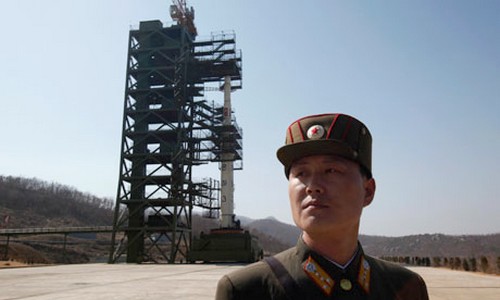Warning of third nuclear test from South Korean intelligence raises tension
ahead of North Korea’s long-range rocket launch

North Korea appears to be preparing for a third nuclear test, South
Korean intelligence has claimed, further raising tensions ahead of Pyongyang’s long-range rocket launch.
North Korea
has already readied the 30-metre high Unha-3 rocket for what they describe as the peaceful launch of an
observation satellite. The launch could take place from a base in the north-west of the country as soon as
Thursday.
The US, Japan, Britain and other governments have urged Pyongyang to cancel the launch, saying it would
violate UN resolutions against ballistic missile activity because the launch technology is near-identical.
China, the
North’s main ally, has expressed concern about the situation on the Korean peninsula. Foreign minister Yang Jiechi urged all
parties “to remain calm and exercise restraint”.
The South Korean warnings of a potential nuclear test raise the
stakes further. An intelligence report distributed to several media outlets said there was a high possibility of a “grave
provocation”, with satellite images showing the final stages of excavation of a new tunnel at the site where the previous
tests were conducted.
The 2009 detonation followed international criticism of Pyongyang’s last long-range rocket
launch.
“Even a few weeks ago, when it became clear North Korea was moving forward with the rocket test, a number of
people saw this inevitable chain of events set in motion – and part of that was a nuclear test,” said Joel Wit of Columbia
University, who runs the 38 North website on North Korea.
The
announcement of the rocket launch took the international community by surprise, coming barely a fortnight after Pyongyang
agreed a deal to suspend nuclear missile tests and uranium enrichment, and submit to international monitoring in return for
US food aid.
Andrei Lankov of Kookmin University said a nuclear test would make sense of the decision to “squeeze
money from Uncle Sam and then slap him in the face”.
“It will deliver a very strong message, the same one as usual. We
are here, we are dangerous and we are getting more dangerous every day,” he said.
“It is designed to show to the
Americans: We don’t care about small change, a quarter of a million tonnes of food. We need much more.”
While such
tactics would rule out any deal before the US elections, he predicted they would probably prove successful in the long
run.
Others, however, believe there are alternative explanations for North Korea’s behaviour. One is that it had
adopted a twin-track strategy of negotiating with the US while simultaneously preparing for a space launch, but that Kim
Jong-il died before reaching a decision on which to pursue and his son Kim Jong-un was not in a position to call off a launch
ordered by his father.
John Delury of Yonsei University said that while a nuclear test was possible, the way that
South Korean intelligence had briefed the media seemed designed to send a message that it was inevitable, when many variables
remained – particularly given Pyongyang’s new and inexperienced young leader, Kim Jong-un.
North Korea has repeatedly
stressed its peaceful nature and has chosen a launch trajectory avoiding Japan. “By North Korean standards they were throwing
a lot of bones to the international community,” Delury said.
David Wright of the global security programme at the
Union of Concerned Scientists said: “The activity [at the test site] may be as much to send a signal as to prepare for a
nuclear test. It may be signalling that if there is international condemnation of its launch and new UN resolutions, it will
do a nuclear test as it did last time. And I suspect it will in that case.”
An alternative course – if the North hoped
to return to the its deal with the US – “would require some finessing of the launch issue, but that’s what diplomats are
supposed to be able to do, right?” he added.
Pyongyang has said the launch will take place between 12 and 16 April to
mark the centenary of the birth of Kim Il-sung, the country’s founder and grandfather of its current
leader.
Unusually, it has taken foreign reporters to the newly built Sohae launch station, 50km from the border with
China.
“Supreme Commander Kim Jong-un made a very bold decision, that is why you are allowed to be this close to the
launch site,” site director Jang Myong Jin told reporters.
Japan and South Korea have said they will shoot the rocket down if it
threatens their territory. North Korea’s state news agency KCNA said interception would be an act of war.
Philippine
Airlines has said it will change the paths of a dozen flights, while Philippine officials have declared a no-fly zone and
told ships and fishing boats to stay away from north-eastern waters lest rocket debris fall there.
The new rocket is
believed to have a range of more than 6,700 km, in theory putting it in reach of the US mainland.
Most experts believe
Pyongyang has yet to develop a re-entry vehicle and will remain a long way from being able to
mount a nuclear warhead on an intercontinental ballistic missile even if this launch is a success. North Korea said its
2009 Unha-2 rocket launch was successful, but other countries said it failed to put a satellite into orbit.



